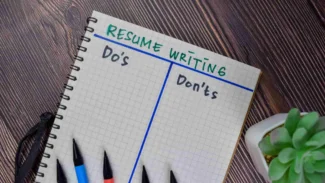In today’s competitive job market, it can be tempting to portray yourself as someone else in order to land your dream role. Although the short-term gratification may seem fulfilling, the fact remains you shouldn’t lie on a resume.
The great author Dr. Seuss once said, “Today you are you, that is truer than true. There is no one alive who is youer than you.”
So, why shouldn’t you lie on a resume? The long-term impact and negative effects far outweigh the temporary thrill. Yet, a large number of people often fabricate information, even if just a little.
It’s worth considering that you’re very likely to get caught. Employers and hiring managers are becoming more tech-savvy and resourceful, leading them to uncover the truth quickly. So they will certainly spot any mistruths you add to your resume.
Below, we’ll examine what you might be tempted to lie about when writing your resume, what you can do instead, and the potential consequences of adding incorrect information to this important document.
Lying About Your Education on a Resume
You might be tempted to lie about your education if you feel that the reality of your schooling isn’t good enough.
Perhaps you have an associate degree when the job listing calls for a bachelor’s, or a bachelor’s when a master’s is required. Maybe you have a degree in a different field. Perhaps you are even self-taught, or you apprenticed with someone without receiving a degree or certification.
The truth is that lying about degrees and certifications is a waste of time for many reasons. A few of the top three reasons are below.
- It’s easy and quick to verify.
- You can land many roles without a degree.
- Many jobs today focus on your skill level instead of a degree.
Lying about your education also comes with consequences. For starters, you might not have the skills needed to perform the job. If your dishonesty is discovered, you might lose your job. It might even harm your reputation and make it more difficult to find employment in the future.
Consider the following example: A falsified educational background made the news in 2022 when The New York Times reported that former United States Representative George Santos hadn’t attended New York University or received a degree from Baruch College as he had claimed.
Santos was expelled from the House of Representatives in December 2023, less than a year after he had taken office. If you have ambitious career goals, you don’t want to become a national household name for lying.
What to do instead
Here’s what you can do to avoid feeling the need to lie on your resume:
- Consider using our resume editor. Our AI resume builder will help you showcase your strengths and unique skills without the need to stretch the truth, ensuring a professional, truthful resume that highlights what you genuinely bring to the table.
- Focus on upskilling. With so many professionals changing careers, running side hustles, and job shadowing, employers know that there’s value in hands-on experience.
- Be honest about your career goals. There are many employers who value transparency. There are even many more employers who are willing to hire a professional who is eager to learn over someone who seems to “have all the qualifications.”
-
Add your text on this side, you can also replace the image block with icon block.
Lying About Your Work Experience
You might want to embellish your work history for similar reasons to those listed above. You might think that listing experience you don’t really have–whether that means listing a higher position, tasks you didn’t perform, or making up an entry entirely–will increase the chances of landing a job.
However, the consequences can be the same as with a falsified education–you may not know how to do your assigned tasks or you may be fired if found out.
Since lying on resumes has become more common, most employers do make an effort to verify your claims. How do they do it? They may ask you for references from former employers by calling or emailing them.
They may also use an employment verification database like The Work Number. This service was created in 1985 and draws on the employment and income information of more than 2.5 million employers. This is similar to the type of background check your bank or car dealership performs before approving a loan or financing.
Depending on the type of job and industry, your future employer may require you to complete a skills assessment. If you can’t demonstrate the skills you touted in your work history, you won’t get the job. At this point, not only have you wasted the employer’s time, but you’ve also wasted your own as well.
At the very least, your potential employer may Google unfamiliar companies you claim to have worked for to verify that they exist in the cited location. They may also Google your name and take a look at your LinkedIn profile and social media accounts to see if your posts line up with your resume.
When it comes to experience on any resume, honesty is the best strategy and personal quality. A well-crafted resume can effectively present your skills and accomplishments without misrepresenting your work history. Use our editor to highlight your authentic experiences, emphasizing real achievements and growth that resonate with potential employers.
What to do instead
Instead of lying about your experience, here’s what you can do instead!
- Volunteer. A quick way to make connections and learn a new skill for free is by volunteering. For example, if you want to become an Event Planner, volunteer to put together an office party or training event. This opportunity can teach you the skills of coordination, facilitation, and mapping out timelines.
- Participate in a Job Shadow. You can get the best of both worlds in this scenario. You can learn from someone who is currently doing the job by work shadowing. Hear the ups and downs, get feedback on any questions you have, and you may even end up with a reference!
- Get a mentor. Mentors have the power to give you access to new opportunities and introduce you to connections that could help you land the type of role you want. A great mentor will also help you put together a plan for developing the skills you need for the type of role you wish to land.
The Five Most Common Resume Lies
These are the top five and the ones any recruitment specialist can quickly detect, so be aware.
- Job title: This is seen as an easy way to exaggerate the importance of a position. Adding words to job titles like ‘executive’ and ‘senior’ is not only transparent to any experienced recruiter but also easy to check!
- Skills: Lying about skills on a resume can be tempting, but it’s also dangerous. If you lie about the extent of your IT skills, for example, it will soon become obvious when you’re asked to use a program that you can’t and have lied about. This is one of the biggest resume lies.
- Responsibilities: People often include extra responsibilities on their resume in order to reach a better position. Interview questions can often make it clear that a person has lied about the responsibilities they’ve claimed to have.
- Dates of employment: Lying about employment dates on a resume is not the answer to filling gaps on a resume, as this information can be easily checked by potential employers with a simple phone call. Instead, focus on what you have achieved between jobs.
- Education: This is one of the worst resume lies and one of the silliest. Firstly, it is easy for employers to check. Secondly, the employer may have been more interested in your experience and personal attributes.
Reasons To Avoid Lying on Your Resume
Lying on a resume may seem like a quick fix to landing a job quickly, but it can lead to serious consequences, including damaging your reputation, lowering your self-esteem, and missing career opportunities that actually align with your natural skill set.
Here’s why honesty on your resume is essential for long-term success.
It can hurt your chances in the hiring process
First and foremost, telling lies on your resume will often lead to failure in getting hired. Making the whole effort pointless and a waste of time.
If you’re caught lying on a resume during the hiring process, you will immediately be ejected from the hiring pool. Unlike in some situations when you fail to make the grade initially, you will probably not be kept in consideration in the event that another similar position comes up in the future.
Quite simply, getting caught lying will burn your bridges completely with the potential employer. Exaggerating your credentials to get hired doesn’t help anyone in the long term. It’s bad for employers and equally detrimental to you as a professional.
The solution and our advice? Always maintain your resume integrity.
You could get a bad reputation among employers
The risks of lying on a resume don’t end with a black mark against your name if a company catches you lying during the hiring process. You could also get a bad reputation when you go for other jobs in your sector.
Bad news always travels fast, especially in the professional world. Different professions have their communities, and within them, word travels fast.
It’s quite possible that other hiring managers and influential people in the industry could learn about your mishandling of the truth, which will immediately give you a disadvantage when you go for other jobs in the future.
You will probably get found out
In most cases, your lies will probably be uncovered. If you made a claim on your resume about a job that doesn’t exist, it can be easily found with a background check. This is one of the most compelling reasons why you shouldn’t lie on your resume.
Most companies do their due diligence when considering candidates for an opening in their ranks. Unsubstantiated claims, jobs that don’t exist, and false references can be quite easily picked apart.
Additionally, if you make claims about skills you don’t have or falsified achievements and you do get offered the job, your new boss will see quickly that things don’t line up.
Is It Illegal To Lie on a Resume?
In most cases, you won’t get into any legal trouble by lying on your resume. However, in a few situations, your mistruths can come back to haunt you in major ways.
This is especially true if you tell lies about any state licensure requirements. Practicing medicine, law, or another profession that’s regulated in this way without the correct credentials will place you and the company in serious jeopardy.
For example, it is illegal to practice medicine without a license. You might face misdemeanor or felony charges, have to pay a fine, or even end up in jail.
Furthermore, if the lies on your resume have cost the company a significant amount of money either through losses or misrepresentation further down the line, you will find yourself in legal hot water.
The company has the right to sue you for not representing yourself properly in this case and for causing harm to their business (operations, morale, and reputation).
What To Do if You Lied on Your Resume
By now, we hope that you have ditched the resume with lies, but in case you are still tempted, there are a few things you should do if you have decided to lie on your resume. These might not save you from losing out on the job, but they can help limit the damage a little.
1. Withdraw your application
By simply exiting the hiring process, you can avoid doing any harm to your reputation.
2. Tell the truth
It may seem difficult to do and will almost certainly stop you from getting the job. However, being open and honest with the hiring manager can calm some of the more negative effects of lies on your resume.
3. Ask yourself why
It’s important to get to the root cause of why you feel like you’re not enough. This is a great opportunity to work with a trained professional (i.e., therapist or career coach) to uncover your insecurities and learn how to overcome them. You could work on boosting your confidence and ability to tell your authentic story with pride!
4. Focus on getting the skills you need
If there’s a skill that you’re lacking, focus on acquiring that skill with some of the suggestions provided above. Mastering the skill will feel more fulfilling than lying about it.
5. Make sure you don’t get caught
This is the least recommended option. If, however, you’re too far down the line, this might seem like your only option. Remember, though, if you get caught, the consequences will be harsh.
In any case, a resume with lies on it is more damaging than helpful. It will need to be updated and replaced with a more accurate and representative document.
Related Posts





